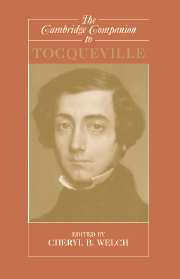Book contents
- Frontmatter
- Introduction: Tocqueville in the Twenty-First Century
- 1 Tocqueville’s Comparative Perspectives
- 2 Tocqueville on 1789: Preconditions, Precipitants, and Triggers
- 3 Tocqueville’s New Political Science
- 4 Tocqueville, Political Philosopher
- 5 Tocqueville’s Democracy in America Reconsidered
- 6 Translating Tocqueville: The Constraints of Classicism
- 7 The Writer Engagé: Tocqueville and Political Rhetoric
- 8 The Shifting Puzzles of Tocqueville’s The Old Regime and the Revolution
- 9 Tocqueville and Civil Society
- 10 Tocqueville on Threats to Liberty in Democracies
- 11 Tocqueville on Democratic Religious Experience
- 12 Tocqueville on Fraternity and Fratricide
- 13 Tocqueville and the French
- 14 Tocqueville and the Americans: Democracy in America as Read in Nineteenth-Century America
- Bibliography
- Index
- Series List
11 - Tocqueville on Democratic Religious Experience
Published online by Cambridge University Press: 28 January 2007
- Frontmatter
- Introduction: Tocqueville in the Twenty-First Century
- 1 Tocqueville’s Comparative Perspectives
- 2 Tocqueville on 1789: Preconditions, Precipitants, and Triggers
- 3 Tocqueville’s New Political Science
- 4 Tocqueville, Political Philosopher
- 5 Tocqueville’s Democracy in America Reconsidered
- 6 Translating Tocqueville: The Constraints of Classicism
- 7 The Writer Engagé: Tocqueville and Political Rhetoric
- 8 The Shifting Puzzles of Tocqueville’s The Old Regime and the Revolution
- 9 Tocqueville and Civil Society
- 10 Tocqueville on Threats to Liberty in Democracies
- 11 Tocqueville on Democratic Religious Experience
- 12 Tocqueville on Fraternity and Fratricide
- 13 Tocqueville and the French
- 14 Tocqueville and the Americans: Democracy in America as Read in Nineteenth-Century America
- Bibliography
- Index
- Series List
Summary
Rather than entering into a discussion of the frequently asked questions - ''Was Tocqueville himself a believer,'' ''Did he think Christianity was true or useful (or both),'' and so on - I will consider whether we can conclude from Democracy in America that there is such a thing as democratic religious experience? To put the question somewhat differently, do the ''conditions of social equality'' about which Tocqueville wrote occasion modes of religious experience that are historically novel, relatively coherent, and distinguishable from what might be called aristocratic religious experience?
In order to investigate this thought, I will rely on Tocqueville's historical schema in Democracy in America, first, to illuminate what I will here call ''the fable of liberalism,'' within which, it is often presumed, religion and democracy are immiscible, and second, to provide an account of certain developments within Christianity in the modern period that Tocqueville intimates can be explained by the emergence of democratic social conditions. My concern, among other issues, will be the emergence of an impulse toward fundamentalism, which I suggest is a necessary development in the democratic age; the increasing claims of unmediated personal religious experience and the decreased importance of religious formalities, which I take to be related phenomena; the appearance of radical claims about the depth of sin; and the crisis of authority in the churches.
- Type
- Chapter
- Information
- The Cambridge Companion to Tocqueville , pp. 276 - 302Publisher: Cambridge University PressPrint publication year: 2006
- 4
- Cited by

